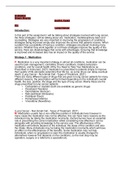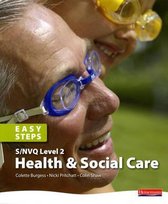S1900454
Sinem Boyraz
Unit14, Task3
P5:
Lung Cancer
Introduction:
In this part of the assignment i will be talking about strategies involved with lung cancer,
the three strategies i will be talking about are: medication, multidisciplinary team and
counselling. Strategies are very important in improving the progression of conditions,
strategies being improved simply also improves the service that patients receive. When
a patient has a possibility of having a condition, strategies are placed involving many
sectors. Whether they work together or not these strategies improve the quality of the
service, there are disadvantages that come with advantages. Ensuring that knowledge
is improved and increased also has an impact on the quality of the service.
Strategy 1 : Medication
P: Medication is a very important strategy in almost all conditions, medication can be
used for pain management, controlling chronic conditions, treating temporary
conditions, and for overall health.(Why You Need to Take Your Medications as
Prescribed or Instructed, 2021) medication is prescribed to patients simply to improve
their quality of life alongside extending their life too, as some drugs can delay eventual
death. (Lung Cancer - Non-Small Cell - Types of Treatment, 2021)
There are many different types of drugs that are given to lung cancer patients for many
different reasons, the prescription will be formed depending on the individual's overall
health, the size, position, the stage and the type of lung cancer. Mainly these are the
drugs prescribed to lung cancer patients:
• Carboplatin or cisplatin (both are available as generic drugs)
• Docetaxel (Taxotere)
• Gemcitabine (Gemzar)
• Nab-paclitaxel (Abraxane)
• Paclitaxel (Taxol)
• Pemetrexed (Alimta)
• Vinorelbine (Navelbine)
(Lung Cancer - Non-Small Cell - Types of Treatment, 2021)
M: Medication usually has a very effective position in individuals lives however in
many cases the medication may not be effective, this can have many reasons as the
individual may be taking the medication incorrectly. doctors/nurses have an essential
role in prescribing the correct medication whilst considering how effective it can be
alongside with providing knowledge to the service user. The effectiveness of the
medication will entirely depend on the individual, the stage of the condition and also
the intake. Many individuals may be taking the medication incorrectly which will have
an effect on the effectiveness of the benefits. Some medication may not help
individuals, when no progression is seen the medication is usually changed to
alternatives however this depends on the conditions, so the next step may be
operation, surgery or a referral to a specialist etc.
, D: Alongside with benefit there are many negatives with medication, some negatives
are due to the medication and some are due to the individual taking the medication. A
very often negative would be neglect of medication, whether that's due to forgetfulness
or due to intentional ignorance.“50% of patients in the U.S. do not take their medications
correctly, Nearly 33% never fill their first prescription at all.” (The Importance of
Medication Management, 2021) the neglect can be due to the individual not having
knowledge on getting their prescriptions, this is why doctors/nurses must ensure
translators are arranged throughout appointments. The elderly that may not have family
members supporting them can struggle, alongside with if they live alone they may forget
to take the medication.
However a benefit would be that many individuals form a daily routine including their
medication to prevent forgetting, they may also have alarms or specific instructions on
taking the medication such as after dinner.
Another weakness of medication can be side effects that it leads to, many medications
can lead to other small side effects such as nausea, headaches etc however some may
lead to other conditions. With lung cancer, this is rare due to lung cancer itself being a
very big condition.
The main reason why medication may be prescribed is for pain management or to
minimise side effects on the condition, this is a very beneficial strategy. Medication
prescribed to those diagnosed with lung cancer will vary on the individual's overall
health, the size, position, the stage and the type of lung cancer. (Lung cancer -
Treatment, 2021) Another benefit will be the comfortability that it leads to, the individual
and their family/friends will feel more confident as they know something is being done
for their loved one. A reduction in stress is noticed once medication has been
prescribed, the reduction of side effects due to the medication will also be a reason for
this.
Strategy 2 : Multi-disciplinary team
P: Multidisciplinary teams have a very important role in the process of the patient's
treatment, the multidisciplinary team consists of many specialists working together to
support and recover/find the best treatment option for the individual. When a condition is
confirmed, the individual requires many referrals and appointments with different
specialists.(Multidisciplinary Team Care - HealthOne NSW, 2021) The multidisciplinary
team ensures this process is easier and professions working together will be beneficial
for the individual as they won't miss important steps, they will also ensure to take the
appropriate steps authorized by all members involved in the team.
Here are many specialists and professionals that may be involved in the
multidisciplinary team:
• general practitioners;
• practice nurses;
• community health nurses;
• allied health professionals (may be a mix of government and non-government
community health professionals) such as physiotherapists, occupational
therapists, dieticians, psychologists, social workers, podiatrists and Aboriginal
Health Workers;
• health educators - such as diabetes educators - providing promotion and
prevention clinics and other activities
(Multidisciplinary Team Care - HealthOne NSW, 2021)





